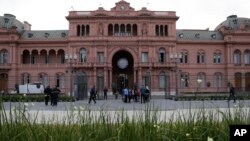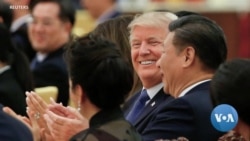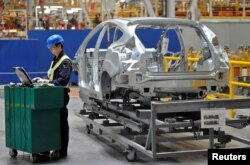U.S. President Donald Trump says the United States is "very close" to a deal with China on tariffs, as he heads to the G-20 summit for highly anticipated talks with Chinese President Xi Jinping aimed at defusing long-running trade tensions.
Trump added Thursday that "I don't know if I want to do it," and that "I like the deal we have now," in remarks to reporters at the White House prior to departing for this week's summit in Buenos Aires, Argentina.
"What we have right now is billions and billions of dollars coming into the United States in the form of tariffs or taxes. So I don't know. But I will tell you that I think China wants to make a deal. I'm open to making a deal," he said.
WATCH: US, China Eye G-20 for Relationship Reset
Expectations are high for the Trump-Xi meeting on the sidelines of G-20, with experts and U.S. officials looking at the talks as a chance to reset the rocky relationship.
"We've got to strive to make sure we avoid miscalculation. That's why I think we should have more dialogue, not less.Even if it's unproductive at times, we want to stay in touch at high levels," said former U.S. Ambassador to China Winston Lord, in a recent interview with VOA.
On the issue of trade, U.S. Trade Representative Robert Lighthizer this week singled out China's policies on automobile tariffs.
"I will examine all available tools to equalize the tariffs applied to automobiles," said Lighthizer who will be attending the G-20.
Trade dispute
Currently, China imposes a 40 percent tariff on U.S. automobiles, which is more than double the rate of 15 percent that China imposes on its other trading partners, and approximately one and a half times higher than the 27.5 percent tariff that the United States applies to Chinese-produced automobiles.
Chinese Foreign Ministry spokesperson Geng Shuang said Thursday the tariffs are part of China's counter-measures after Trump ordered a 10 percent tariff hike on $200 billion worth of Chinese goods and then threatened to increase that to 25 percent.
"It is impossible to achieve absolute reciprocity in every single industry," Geng told reporters in Beijing. "What is pressing now for the two sides is to settle trade disputes and problems through dialogue and consultation based on mutual respect, equality and good faith."
Need for dialogue
U.S. officials are also emphasizing the need for dialogue during the summit.
"Ensuring free, fair, and reciprocal trade and a system of fair economic competition" is among the priorities when Trump meets with Xi on the sidelines of G-20, said State Department spokesperson Heather Nauert.
Business industry and investors are warning of the damage caused by the ongoing trade dispute between the two largest economies in the world.
"U.S. tariffs on $200 billion worth of Chinese products going to 25 percent on January 1st, 2019, would pose a large shock to the U.S. economy through multiple channels and point to a serious escalation of the trade dispute," said Elena Duggar of Moody's Investors Service.
"As costs jump for a wide range of U.S. industries that use Chinese goods as inputs, we estimate the tariffs to add about 0.50 percentage point to inflation. U.S. households would bear the burden as the prices of a range of items would rise significantly," she added.
Security differences
Washington also accuses Beijing of cyber-enabled economic espionage for commercial gains, violating its obligations as a World Trade Organization member, continuing reckless military actions in the disputed South China Sea, and meddling in America's democracy.
David Shambaugh, Director of China Policy Program at George Washington University's Elliott School of International Affairs, says the "competitive, stressed, complicated, and fraught relationship" between the U.S. and China is a "new normal."
"This is a very serious downturn. This is not a temporary phenomenon," said Shambaugh. "People think we're going to get back to some sort of harmonious cooperation. They're dreaming," he noted during an interview with VOA's Mandarin service.
Others say neither the U.S. nor China wants a conflict or war. But the biggest problem is a potential miscalculation.
"We should manage our competition, which is inevitable, but try to make sure it's peaceful, and we should try to carve out, still, areas where we might cooperate," former U.S. Ambassador Lord said.







